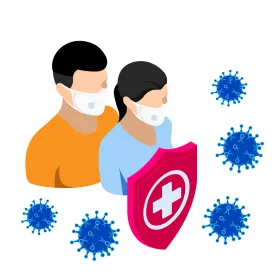Over the past few weeks, the focus of the COVID-19 pandemic has shifted towards the reopening of businesses, including resuming non-emergent health care postponed under prior guidance. The initial stages of COVID-19 created an overwhelming burden on health care facilities, and, in response, federal and state agencies directed health care facilities to limit non-essential procedures in an effort to conserve hospital beds, personnel and other necessary resources for COVID-19 related care. As a result of postponed or canceled procedures, health care facilities experienced a dramatic decrease in revenue, and patients have not received necessary non-COVID-19 services.
As discussed in our legal alert on April 24, 2020, CMS released recommendations to assist providers in resuming non-emergent, non-COVID-19 services in regions of the country with low and steady rates of COVID-19 cases (“Recommendations”) on April 19, 2020. CMS’ Recommendations provide a road map for hospitals and other providers to consider in determining when and how to resume non-emergent procedures, including incidence trends of COVID-19 in their service areas, the importance of the care based upon the patient’s medical conditions, ensuring sufficient resources are available across all phases of care and establishing separate COVID-19 treatment areas.
Following the release of CMS’ Recommendations, many states and localities have lifted previously issued orders prohibiting non-emergent, non-COVID-19 services by issuing updated orders and guidance for resuming non-emergent services. State guidance varies, but as a threshold matter, often includes the following factors that hospitals and other providers should consider prior to resuming non-emergent care: (a) a low or downward trend of COVID-19 patients in the facility or region, as applicable; (b) adequate personal protective equipment (PPE); (c) separate COVID-19 treatment areas; and (d) sufficient COVID-19 pre-screening or testing capabilities for patients and staff. Most state orders also instruct clinicians to consider the nature of the patient’s medical condition before providing care. This alert highlights the resumption policies of three specific states: Illinois, New Jersey and Pennsylvania.
Illinois
-
The Illinois Department of Public Health (IDPH) issued guidance on March 17, 2020, recommending the cancellation of all elective surgeries and procedures and defined “elective” as those procedures that are pre-planned by both the patient and the physician that are advantageous to the patient, but are not urgent or emergent. On March 20, 2020, Governor J.B. Pritzker issued a sweeping stay-at-home order to cease non-essential businesses activities, which was replaced by a relaxed version effective May 1, 2020 through May 31, 2020. Separately, the Commissioner of Health of the City of Chicago issued an order on March 19, 2020 that required acute care and long-term care hospitals within the city to postpone elective surgeries and medical procedures.
-
On April 24, 2020, the IDPH issued new guidancethat Illinois hospitals and ambulatory surgical treatment centers may resume elective surgeries beginning on May 11, 2020, provided certain requirements are met, including ensuring proper PPE, adequate space for COVID-19 patients and COVID-19 testing for all elective surgery patients. On May 13, 2020, Governor Pritzker issued Executive Order 2020-37 which references the IDPH requirements relating to the resumption of elective procedures.
New Jersey
-
On March 23, 2020, Governor Phil Murphy issued Executive Order No. 109 which required all “elective” surgeries and “elective” invasive procedures, whether medical or dental, to be suspended in New Jersey. Elective surgeries or invasive procedures were defined as any surgery or procedure that the patient’s doctor or dentist determined could be delayed without undue risk to the current or future health of the patient.
-
On May 15, 2020, Governor Murphy issued Executive Order 145 rescinding the suspension on elective surgeries and invasive procedures and permitting such surgeries and procedures to proceed at health care facilities and in outpatient settings beginning at 5 a.m. on May 26, 2020. Further, on May 19, 2020, the New Jersey Department of Health issued guidance for hospitalsand ambulatory surgery centers (ASCs) to resume elective surgeries and invasive procedures. The guidance outlines a number of different requirements which hospitals and ASCs must meet in order to resume elective surgeries and invasive procedures, including the overall conditions that hospitals and ASCs must meet in order to resume such surgeries and procedures; PPE and staffing requirements for these facilities; standards for hospitals and ASCs to use to guide prioritization of performance for these surgeries and procedures; and COVID-19 testing requirements which patients seeking procedures must undergo.
Pennsylvania
-
On March 19, 2020, Governor Tom Wolf issued an executive order requiring the closure of all non-life sustaining businesses, as later amended, pursuant to which, all hospitals, ambulatory surgery facilities, physicians’ offices, and outpatient centers were listed as life-sustaining businesses, subject to limitations on elective procedures. On March 21, 2020, the Pennsylvania Department of Health issued Guidance on Hospitals’ and Ambulatory Surgical Facilities’ Responses to COVID-19 stating that all hospitals and ambulatory surgical facilities postpone or cancel elective admissions, surgeries and procedures, except for surgical services that would be emergent or urgent to save a life, preserve organ function, or avoid further harms from an underlying condition or disease.
-
On April 27, 2020, the Pennsylvania Department of Health updated its Guidance on Hospitals’ and Ambulatory Surgical Facilities’ Responses to COVID-19 to permit the performance of elective procedures and surgeries, but only if a facility makes an affirmative decision that it is able to do so without jeopardizing the safety of patients and staff or the facility’s ability to respond to the COVID-19 emergency. Such determinations are to be made in accordance with guidance from the American College of Surgeons, American Society of Anesthesiologists, Association of Perioperative Registered Nurses, and American Hospital Association. On May 9, the Pennsylvania Department of Health issued guidance on COVID-19 for health care providers stating that providers may decide to resume non-urgent and elective care, but only where appropriate PPE is available, patients are screened for COVID-19 symptoms and telemedicine is not clinically sufficient.
Hospitals and other health care facilities should continue to monitor developments in their states as they resume non-emergent care.






 />i
/>i

